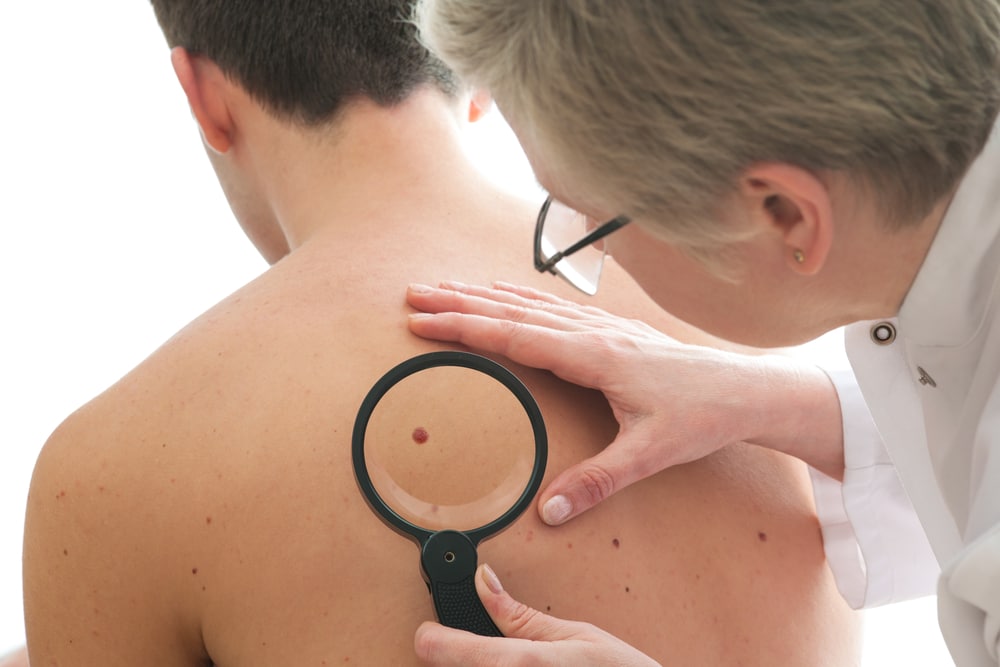When David reluctantly scheduled a skin cancer screening at his wife’s insistence, the examination revealed early-stage melanoma on his toe that was completely curable with minor office surgery—illustrating why annual full-body skin checks by board-certified dermatologists are crucial, especially given that skin cancer affects 3.5 million Americans yearly (exceeding breast, colon, lung and prostate cancers combined), with melanoma being particularly dangerous yet highly curable when caught early, making prevention through sunscreen use, avoiding peak sun hours, and regular professional examinations far easier and less invasive than procedures like colonoscopies.
David’s Story: How Listening to His Wife Saved His Life
Let’s face it: most men (including me) hate going to the doctor. It often takes a great deal of pushing and prodding. Luckily for David, he listened to his wife, who had been nagging him to come in for a skin check. Reluctantly, he scheduled an appointment for a skin cancer screening.
David was in good health but had some risk factors for skin cancer—his sister had been diagnosed with skin cancer, and he had an outdoor job, recalling multiple sunburns throughout his life. We checked him from head to toe and found a spot on his toe with irregular pigmentation. A biopsy showed that it was melanoma in-situ, the earliest stage at which melanoma can be diagnosed. Fortunately for David, the cure rate at this stage is over 99%. He underwent a minor in-office surgical procedure to cure his skin cancer.
The Importance of Skin Cancer Awareness
May marks Skin Cancer Awareness Month, highlighting the importance of regular skin checks. Every year in the United States, about 3.5 million cases of skin cancer are diagnosed. In 2016 alone, it was estimated that 144,860 cases of melanoma would be diagnosed. In fact, there are more cases of skin cancer than breast, colon, lung, and prostate cancers combined.
Melanoma is the most serious form of skin cancer because it can be lethal. However, the good news is that early diagnosis leads to complete cures. Surprisingly, melanoma is the most common cancer for young adults aged 25-29. It is responsible for approximately 75% of skin cancer deaths. But the earlier melanoma is detected, the better the chances for survival.
Common Types of Skin Cancer and Their Warning Signs
Basal Cell Carcinoma (BCC)
BCC can appear as non-healing sores, crusted bumps, or red patches. These can often be mistaken for dry skin or eczema, but they are less likely to spread. Early detection through a skin biopsy leads to effective treatment, often with minor in-office surgical procedures.
Squamous Cell Carcinoma (SCC)
SCC may appear as firm, red nodules or flat lesions with a scaly surface. Like BCC, SCC tends to occur on sun-exposed areas and is less likely to spread if treated early.
Melanoma
Melanoma is the most dangerous skin cancer and can arise from a pre-existing mole or as a new spot. It’s crucial to detect melanoma early for the best prognosis.
Prevention and Early Detection: What You Can Do
Most skin cancers have a genetic component, but the key factor is sun and UV exposure—especially from tanning beds. To prevent skin cancer, I recommend the following:
- Avoid peak sun hours (10 AM to 2 PM).
- Apply and reapply broad-spectrum sunscreen.
- Skip tanning beds (spray tans are fine).
- See a board-certified dermatologist once a year for a full-body skin check.
- Perform monthly self-checks to spot any changes in moles or spots.
Why Men Should Get Regular Skin Checks
Many men avoid seeing the doctor, but regular skin checks are quick and easy. They’re much less invasive than other screenings like colonoscopies, and they could save your life. If you have any spots that concern you or if you can’t remember the last time you had a full-body skin check, don’t wait—call my office today at 925-838-4900 to schedule an appointment.



















